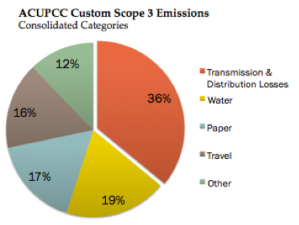By Sarah Brylinsky, Program Associate, Second Nature
(This article appears in the September, 2012 issue of The ACUPCC Implementer)
Scope 3, or indirect emissions not covered by Scope 2, are a challenging set of categories to gather data for in greenhouse gas (GHG) reporting, but are essential for campuses to fully account for their upstream and downstream climate footprint. Greenhouse gas reporting for the ACUPCC requires signatories to submit two categories of Scope 3 emissions: regular daily commuting to and from campus by students, faculty, and staff and air travel paid for by or through the institution. The
ACUPCC encourages signatories to go beyond these requirements and submit additional indirect emissions categories. An analysis of ACUPCC GHG reports demonstrates that many signatories have chosen to report additional scope 3 emission categories. Of the 93% of the signatories that have submitted at least one GHG report, 65% have included information on their solid waste emissions and 20.6% have elected to report custom scope 3 emissions.

ACUPCC signatories had reported these custom Scope 3 sources in publicly submitted greenhouse gas inventories as of August 2012 (Data taken from rs.acupcc.org)



